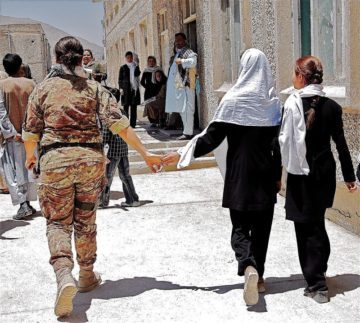Fawzia Afzal-Khan in Counterpunch:
 The case at hand that prevents me from an unqualified rooting for the category of “experience,” is the exemplary case of Malala Yousafzai of Pakistan, who has traversed the distance from female “experience” to feminist “expertise”, and who, like others before (and since) that have made that journey from the “margins” to the “center” of imperial power, has now switched from being a “voice of the oppressed” to becoming an “expert” who can speak to us and teach us about those authentic “other” women in the global south—in this case, Afghan women– to whom her prior proximity (“experience”)– renders her an “expert” on today. From experience to expertise then, is a pretty straightforward line, following the predictable path forged also by white feminism in thrall and service to imperial designs past and present. This is the path that was announced with great fanfare shortly after 9/11 by First Lady Laura Bush and enthusiastically supported by the Feminist Majority Foundation, that would “save brown women from brown men” by going in to the “backward” country of Afghanistan overrun by crazy “Moslem” men, in the process unleashing a 20-year war on the population that had had nothing to do with 9/11. The initial military intervention was then followed up over the next two decades with countless “development” schemes that enriched a few at the expense of the many, and when the cost of this unending war became unpopular with the citizenry “back home” in the USA over time—we left the hapless “natives” that included those very women we had been so concerned with “saving,” at the mercy of anarchy and chaos.
The case at hand that prevents me from an unqualified rooting for the category of “experience,” is the exemplary case of Malala Yousafzai of Pakistan, who has traversed the distance from female “experience” to feminist “expertise”, and who, like others before (and since) that have made that journey from the “margins” to the “center” of imperial power, has now switched from being a “voice of the oppressed” to becoming an “expert” who can speak to us and teach us about those authentic “other” women in the global south—in this case, Afghan women– to whom her prior proximity (“experience”)– renders her an “expert” on today. From experience to expertise then, is a pretty straightforward line, following the predictable path forged also by white feminism in thrall and service to imperial designs past and present. This is the path that was announced with great fanfare shortly after 9/11 by First Lady Laura Bush and enthusiastically supported by the Feminist Majority Foundation, that would “save brown women from brown men” by going in to the “backward” country of Afghanistan overrun by crazy “Moslem” men, in the process unleashing a 20-year war on the population that had had nothing to do with 9/11. The initial military intervention was then followed up over the next two decades with countless “development” schemes that enriched a few at the expense of the many, and when the cost of this unending war became unpopular with the citizenry “back home” in the USA over time—we left the hapless “natives” that included those very women we had been so concerned with “saving,” at the mercy of anarchy and chaos.
It is against this backdrop of “expertise” (represented back then by policy feminists such as those at the helm of the Feminist Majority Foundation who supported the war in Afghanistan ostensibly to “save” those poor brown Muslim women from the Taliban)–that the “voice” of Malala Yousafzai of Pakistan who was shot at by the Pakistani branch of the Taliban for wanting to attend school—needs to be understood and assessed when she speaks today in the aftermath of that war. Obviously, the spill-over effects of the 20-year war into neighboring Pakistan negatively affected Malala herself (she almost died because of the Taliban attack upon her), but those same circumstances also helped her ascend to worldwide fame, leading her to being read/seen as the “voice of experience” (by western feminists and policy makers), whose “voice” could then be mobilized in service of several of the goals of the continuing War on Terror.
More here.
